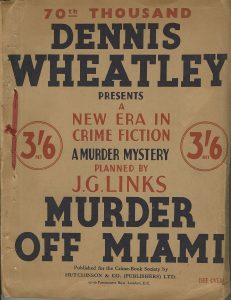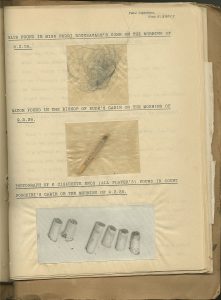Working with rare books is a sort of detective work. Of course, our puzzles are usually of the bibliographical sort, but there is still the thrill of finding the unexpected. I felt like a detective recently when I came across Murder Off Miami, an unusual mystery novel in the RBC’s Mystery-Detective Collection.

In the 1930s, British author Dennis Wheatley teamed up with travel writer and art connoisseur J.G. Links to write a series of radically original “crime dossier novels,” which continue to challenge our definition of the book. The novels take the material form of a police dossier file–complete with the standard tan British police folder, facsimiles of telegrams, police reports, photographs, and physical “evidence,” like a scrap of a bloody curtain or matted hair. Wheatley’s first dossier novel, Murder Off Miami (1936), takes place on a private yacht, where a police officer collects evidence in wake of the apparent suicide of the business magnate, Bolitho Blane. Wheatley introduces a number of unsavory and scandal-ridden suspects to satisfy the sensationalist expectations of the 1930s popular reading audience.

Although the plot is a conventional whodunit, the novel lacks traditional narrative devices and challenges readers to solve the crime from the material evidence provided in the file. Much of the narrative suspense derives from the limitations of physical evidence: photographs that fail to capture key clues in the murder scene, delayed telegrams, and omitted pages. The rise of our own digital culture enables us to see Wheatley’s dossier novels as bibliographic products of their time. The unusual file format emerges out of the rapid proliferation of information and the bureaucratization of crime control in the early twentieth century. Gone, for the moment, is the archetypal Sherlock Holmes and the myth of the eccentric and brilliant detective. Instead, Wheatley’s “detective” is the bureaucrat paging through office files, and the “book” is transformed into an assemblage of material scraps. It is only in the wake of our own information revolution that dossier novels like Murder Off Miami seem to romanticize the office, archive, library and almost limitless unprocessed data. What makes Wheatley’s detective novel so fascinating is that the files, scraps, invoices, and receipts we still encounter every day are given new meaning and interpretive power . . . if only we know how to read them.
